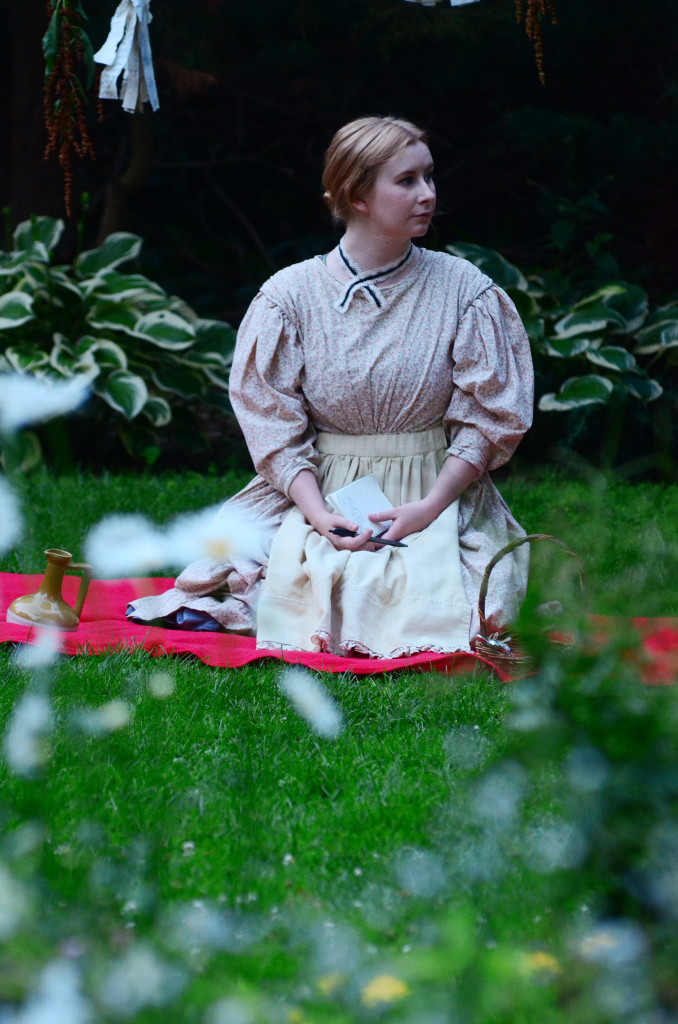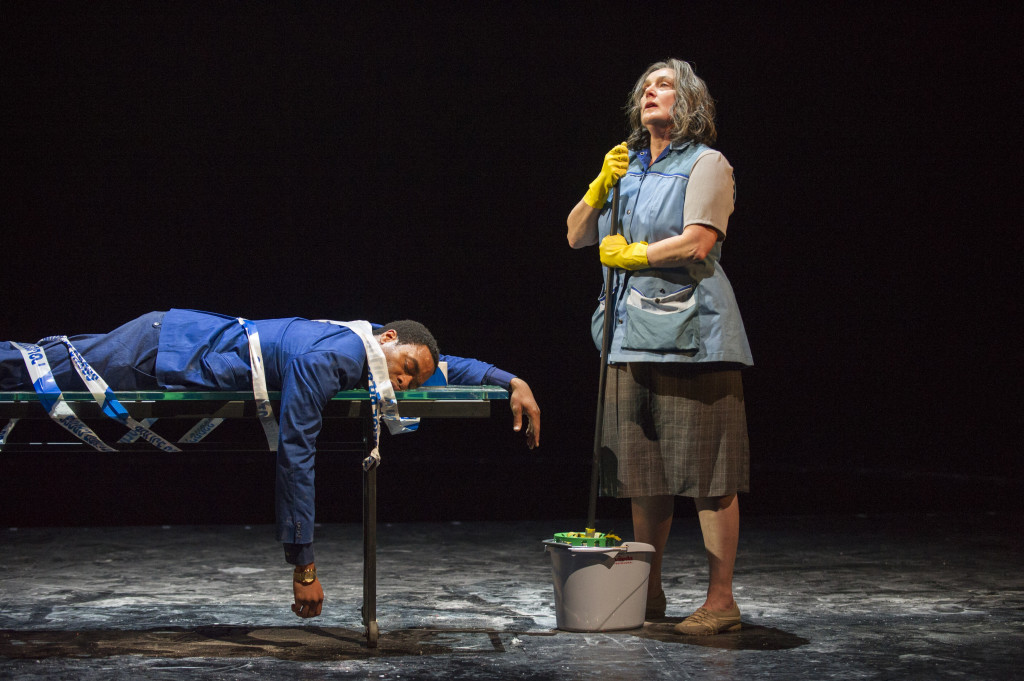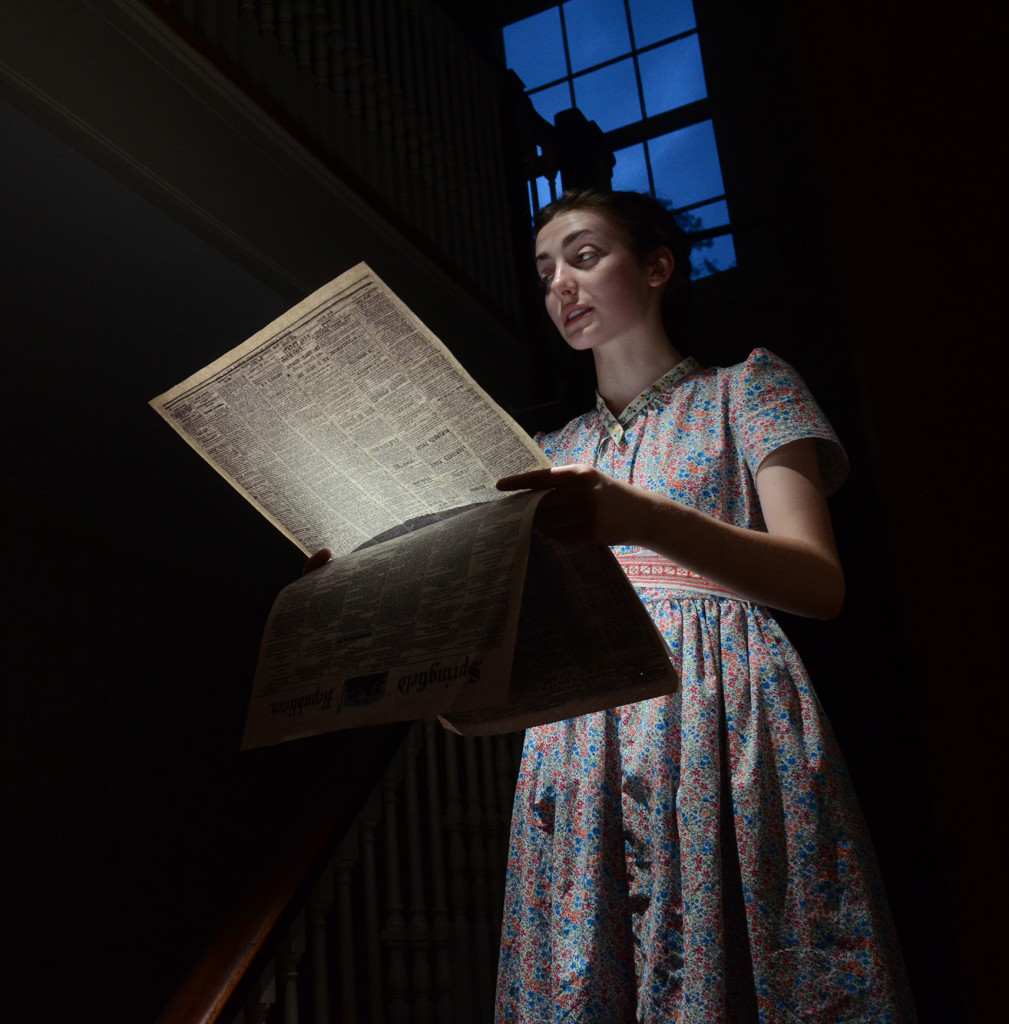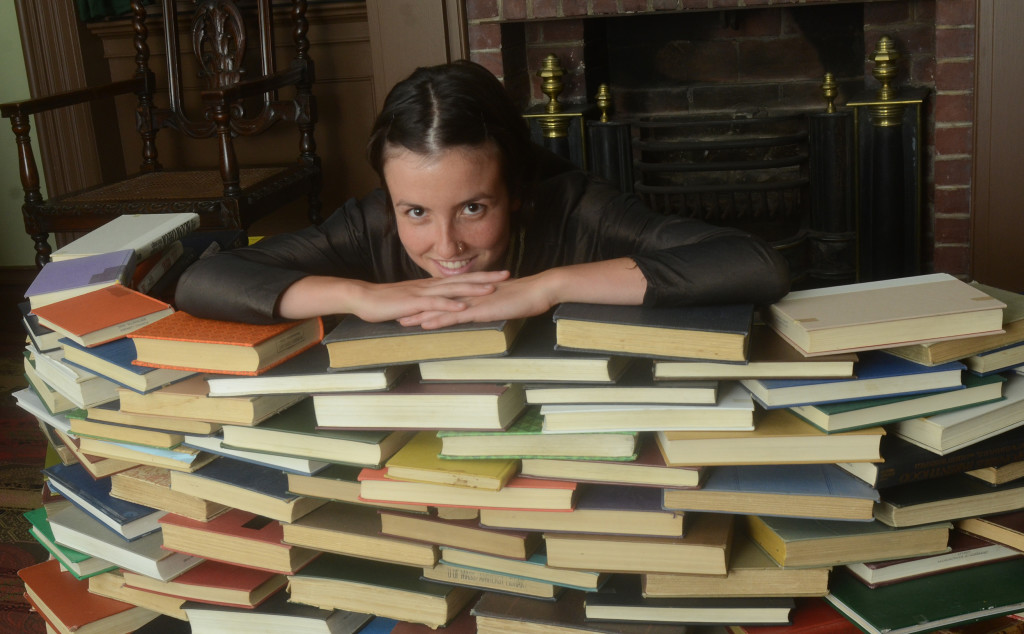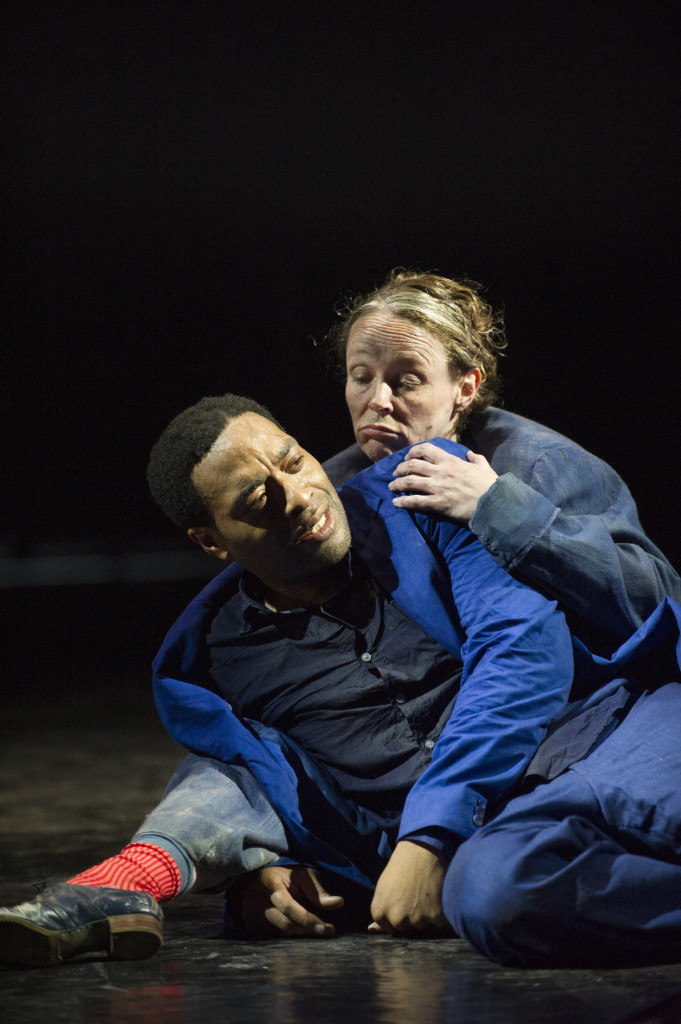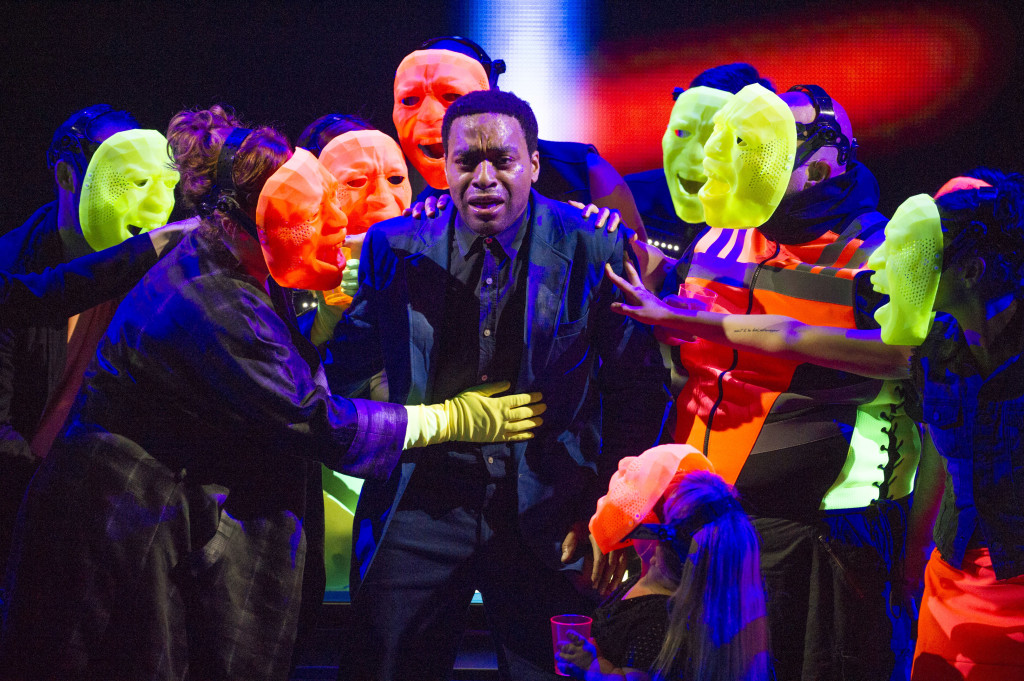In the National Theatre’s ultra-modern new Everyman, God is a London cleaning lady and Death an ironic Irishman with a shopping bag for a scythe. It’s the latest in the Amherst Cinema’s NT Live series of HD satellite broadcasts from the London stage, and it’s eye-popping – a crafty blend of timeless truths with contemporary concerns, gorgeous visuals with muscular verse.
The 15th-century morality play’s language, context and allegorical characters have been brazenly reconceived, updated and secularized by the National’s new artistic director, Rufus Norris, and Britain’s Poet Laureate, Carol Ann Duffy (the first woman ever to hold the post, not to mention the first out lesbian). The script is vernacular, shamelessly jokey and obscene, with lyrical flights that swoop in and out of rhyme and meter. Staged by Norris and choreographer Javier de Frutos, it’s almost a piece of movement theater, in which intimate dialogues open out into set pieces of throbbing music and dance.
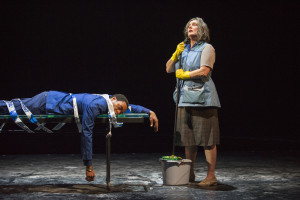 The play begins with a wild party in a high-rise disco, a 40th-birthday bash for the title character. God, charged with tidying up before the guests arrive and cleaning up the mess afterward, complains that people nowadays are only interested in pleasure and profit: “Behold, it was all good,” she says in a Cockney drawl, “but now it’s all trash.” When our hero steps off the balcony into midair in a coke-stoked stupor, Death (“God’s heavy, if you like”) informs him that it’s time to make an accounting of his life – a summary judgment at the court of last resort, and he’d better take some character witnesses with him.
The play begins with a wild party in a high-rise disco, a 40th-birthday bash for the title character. God, charged with tidying up before the guests arrive and cleaning up the mess afterward, complains that people nowadays are only interested in pleasure and profit: “Behold, it was all good,” she says in a Cockney drawl, “but now it’s all trash.” When our hero steps off the balcony into midair in a coke-stoked stupor, Death (“God’s heavy, if you like”) informs him that it’s time to make an accounting of his life – a summary judgment at the court of last resort, and he’d better take some character witnesses with him.
This Everyman is a sharp-suited, Rolexed dude who’s worked hard to make it big and parties hard to flaunt it. He’s been a good citizen who plays by the rules – the rules of this hard-edged world, that is, but they don’t work in the hereafter, so his search for companionship on the strait and narrow way proves frustrating.
His friends are happy to rave with him, but pass on sticking around when the party’s over. He next asks his family, but Dad is demented, Mum is mad that he never visits and Sister is bitter about ending up as their spinster caretaker. The Worldly Goods he hopes to take with him are gold-laméd hoofers in a floor show, glittering BFFs but only until the credit card is cancelled.
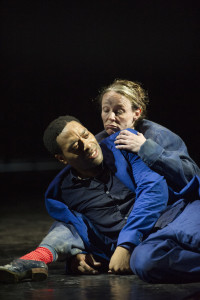 When he’s down and out on a trash heap that represents the quality of his Good Deeds, it’s Knowledge, a scruffy, scrappy bag lady – the one who knows what life is really like – who finally agrees to accompany him. Before he reaches his destination there’s a climate change apocalypse (caused not just by Everyman but by every man) and a beautiful celebration of the five senses and “the marvel of now.”
When he’s down and out on a trash heap that represents the quality of his Good Deeds, it’s Knowledge, a scruffy, scrappy bag lady – the one who knows what life is really like – who finally agrees to accompany him. Before he reaches his destination there’s a climate change apocalypse (caused not just by Everyman but by every man) and a beautiful celebration of the five senses and “the marvel of now.”
Chiwetel Ejiofor is a magnetically watchable Everyman, threading a torturous path from strutting pride though disbelief and defiance to humility and gratitude. Ejiofor is an intense actor – as you’ll recall from Twelve Years a Slave – at times a bit too intense, as if trying to pull the vehicle single-handed to the final reckoning. But where Everyman has to walk that lonesome valley mostly by himself, Ejiofor has a host of willing and very able companions, about 20 of them, for his 100-minute journey on the Olivier stage.
Everyman plays at the Amherst Cinema this Saturday, July 25, at 1 p.m. (413) 253-2547, amherstcinema.org.
The manuscripts of Emily Dickinson’s poems often contain variations and alternatives to words in the text – multiple possibilities for multifaceted thoughts. That’s the inspiration for the Emily Dickinson Project, which imagines the multiple Emilies who gave birth to that diversity of expression. In contrast to a single Everyman representing all men, here’s an EveryEmily, if you will, offering a prismatic take on one extraordinary woman.
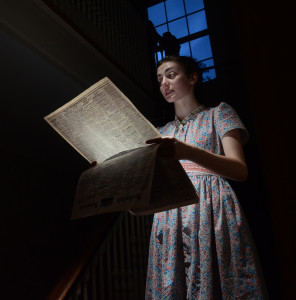 The piece, a co-production of the new Theatre Truck collaborative and the Emily Dickinson Museum, was created from Dickinson’s letters and poems by Emma Ayres and Brianna Sloane and designed by Elizabeth Pangburn. It employs eight actresses, representing “variations” of the poet at various life stages, none of them attempting to resemble the standard daguerreotype image.
The piece, a co-production of the new Theatre Truck collaborative and the Emily Dickinson Museum, was created from Dickinson’s letters and poems by Emma Ayres and Brianna Sloane and designed by Elizabeth Pangburn. It employs eight actresses, representing “variations” of the poet at various life stages, none of them attempting to resemble the standard daguerreotype image.
Only one of the octet of Emilies approximates the pale, shy recluse we generally imagine. The rest are fairly bursting with excitement, as eager to communicate with us face-to-face as the poetess was in her writings. This is no tour of the house and grounds with biographical overview, or one of those historical recreations with costumed “interpreters” at separate stations. It’s an entrancing immersive experience that confounds expectations and sizzles with energy and imagination.
As we enter the garden of her Amherst homestead in a small group, we’re greeted by three Emilies (Corinne Huschle, Julie Rosier and Gwendolyn Bliss Tunnicliffe) who invite us to help plant seeds in the perennial beds, before a prancing Young Emily (Emery Henderson) leads us to the Fairy Queen (Emily Taradash) serving tea beneath a spreading oak, and then into the house.
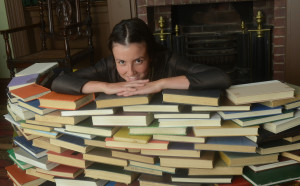 As we pass through the rooms, we come upon various Emilies absorbed in reading or writing, baking gingerbread in the kitchen, composing letters in the parlor. The Scholar (Ayres) is crouched in the library behind a fortress of stacked books; the Lady in Blue (Elizabeth McAnulty Quilter) quotes from Jane Eyre and Antony and Cleopatra before lying in candle-lit state as her 1886 obituary is read aloud.
As we pass through the rooms, we come upon various Emilies absorbed in reading or writing, baking gingerbread in the kitchen, composing letters in the parlor. The Scholar (Ayres) is crouched in the library behind a fortress of stacked books; the Lady in Blue (Elizabeth McAnulty Quilter) quotes from Jane Eyre and Antony and Cleopatra before lying in candle-lit state as her 1886 obituary is read aloud.
Upstairs in the poet’s bedroom we finally encounter the Myth (Maria José Botelho and Wendy Kohler alternating performances), writing silently and obsessively, a cascade of papers making a skirt of her little table and a manuscript of her skirt.
Wednesdays–Saturdays at 8 p.m. through August 2nd, $18-$25, rain or shine, Emily Dickinson Homestead, 280 Main Street, Amherst. The run is fully reserved, but a waiting list starts at 7:30 and the chances are good. Info at thetheatretruck.com.
Everyman photos by Richard Hubert-Smith; Emily photos courtesy of the Emily Dickinson Museum.
If you’d like to be notified of future posts, email StageStruck@crocker.com

